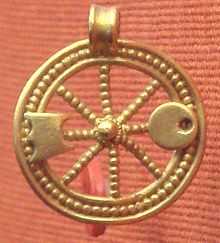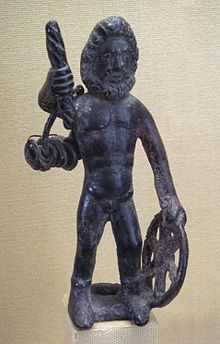Artio
Artio (Dea Artio in the Gallo-Roman religion) was a Celtic bear goddess. Evidence of her worship has notably been found at Bern. Her name is derived from the Celtic word for "bear", artos.[1]
Representations and inscriptions
A bronze sculpture from Muri, near Bern in Switzerland shows a large bear facing a woman seated in a chair, with a small tree behind the bear. The woman seems to hold fruit in her lap, perhaps feeding the bear. (Deyts p. 48, Green pp. 217–218). The sculpture has a large rectangular bronze base, which bears an inscription. (CIL 13, 05160)
- Deae Artioni / Licinia Sabinilla
To the Goddess Artio (or Artionis), from Licinia Sabinilla. If the name is Gaulish but the syntax is Latin, a dative Artioni would give an i-stem nominative *Artionis or an n-stem nominative *Artio. That would perhap correspond to a Gaulish n-stem nominative *Artiu.
Other inscription to the goddess have been discovered in Daun (CIL 13, 4203), Weilerbach (CIL 13, 4113), Heddernheim (CIL 13, 7375 [4, p 125]), and Stockstadt (CIL 13, 11789).
Etymology
Her name is derived from the Gaulish word artos, bear (Delamarre 2003 p. 55-56), from Proto-Celtic *arto-, from Proto-Indo-European *h₂ŕ̥tḱos, bear. A Celtic word may also be the source for the name Arthur.
Notes
- ↑ Adrian Room, Placenames of the World: Origins and Meanings of the Names for 6,600 Countries, Cities, Territories, Natural Features, and Historic Sites, McFarland, 2006, p. 57.
References
- Corpus Inscriptionum Latinarum (CIL) vol XIII, Inscriptiones trium Galliarum et Germaniarum
- Delamarre, X. (2003). Dictionnaire de la Langue Gauloise (2nd ed.) Paris: Editions Errance. ISBN 2-87772-237-6
- Deyts, Simone (1992) Images des Dieux de la Gaule. Paris: Editions Errance. ISBN 2-87772-067-5.
- Green, Miranda (1992) Animals in Celtic Life and Myth. London: Routledge. ISBN 0-415-18588-2
- Wightman, E. M. (1970) Roman Trier and the Treveri London: Hart-Davis. ISBN 0-246-63980-6
External links
| Look up Artio in Wiktionary, the free dictionary. |
| Wikimedia Commons has media related to Artio. |
- Artio at Obscure Goddess Online Directory
- Picture of an Artio ex-voto at Stefan Rebsamen Bern Historical Museum
In popular culture
She is the main antagonist in volume 15 of the Japanese light novel "Campione"

